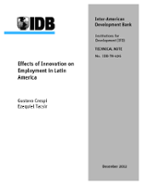Effects of Innovation on Employment in Latin America
Date
Dec 2012
This study examines the impact of process and product innovation on employment growth and composition in Argentina, Chile, Costa Rica, and Uruguay using micro data from innovation surveys. Based on the model put forward by Harrison et al. (1998), employment growth is related to process innovations and to the growth of sales separately due to innovative and unchanged products. Results show that compensation effects are pervasive and that the introduction of new products is associated with employment growth at the firm level. No evidence of displacement effects due to the introduction of product innovations was observed. With respect to the impact of innovation on employment composition, there is scant evidence of a skill bias, although product innovation is more complementary to skilled than to unskilled labor.



